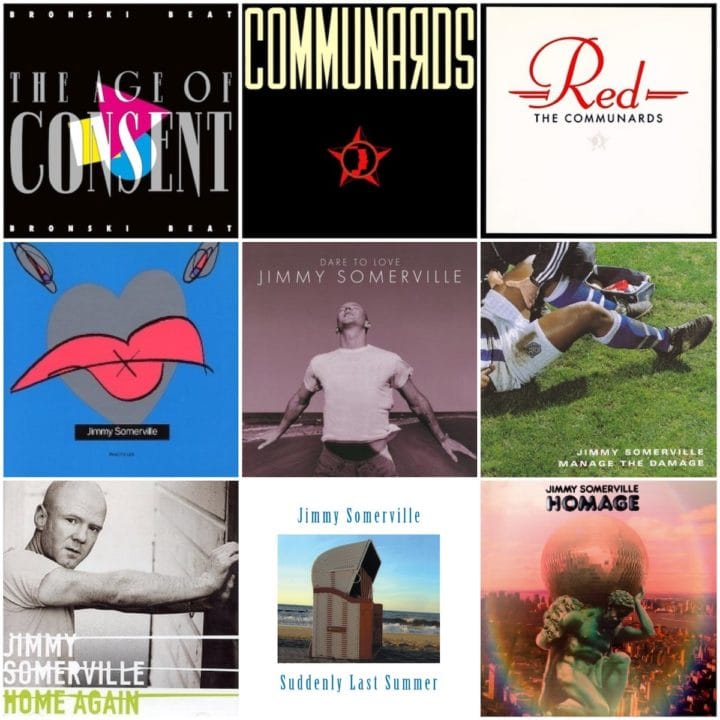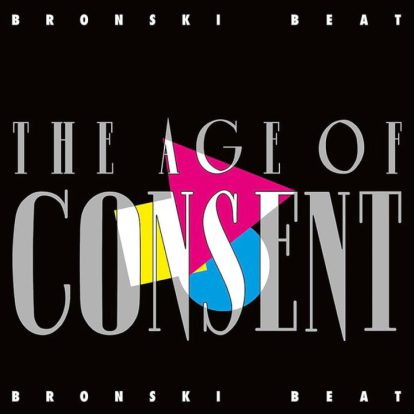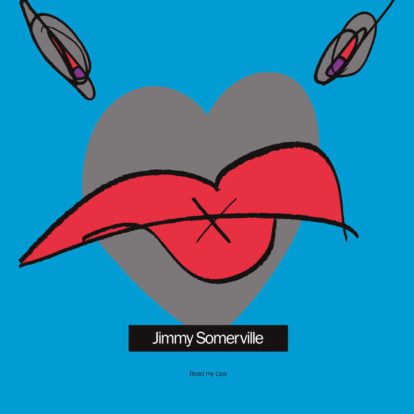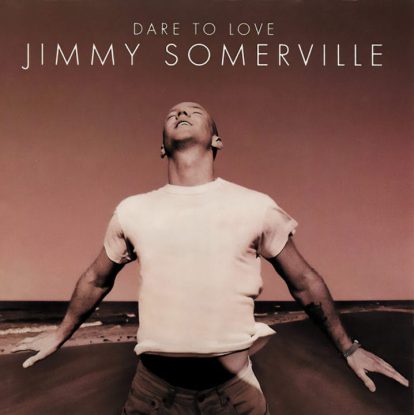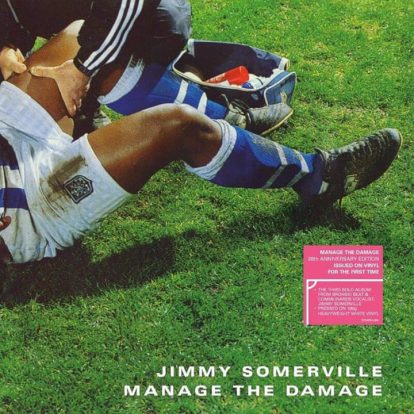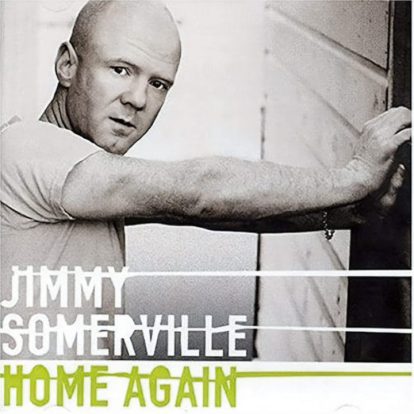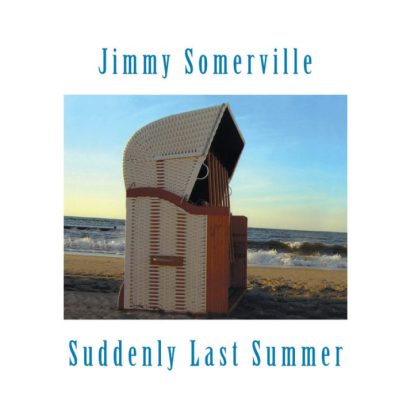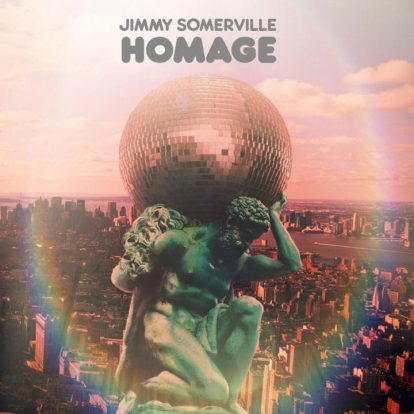Renowned for his piercing falsetto and LGBTQ+ activism, Jimmy Somerville first found fame as the frontman of Bronski Beat and The Communards before launching his own sporadic solo career which continued to break down pop’s vocal and thematic barriers…
Bronski Beat: The Age Of Consent (1984)
Formed by the group’s frontman Jimmy Somerville, his fellow Glaswegian Steve Bronski and Londoner Larry Steinbachek, Brixton flatmates Bronski Beat arrived at a time when mainstream pop was inarguably at its queerest. But believing their fellow gay artists, whether out and proud or remaining firmly in the closet, were terrified of offending middle England, the trio were determined to wave the rainbow flag lyrically rather than merely aesthetically.
Referencing the fact that, unlike most of Western Europe, Britain’s homosexual age of consent was five years higher than the heterosexual, the group’s debut album was overtly political, overtly socially conscious (its inner sleeve featured contact details for LGBTQ+ legal advice) and, on a musical level, overtly idiosyncratic.
Indeed, the album’s trio of Top 10 singles would suggest The Age Of Consent to be a full-blown synth-pop affair. However, complete with rhythmic middle eight from tap dancer Caroline O’Connor, Heatwave is a finger-clicking jazz club affair that’s inspired by Peggy Lee. Ain’t Necessarily So is a lounge-pop cover version of the number from the 1935 opera Porgy And Bess about the veracity of the Bible.
Powerful Manifesto
Screaming, a finished version of the track Somerville recorded for counterculture doc Framed Youth: The Revenge Of The Teenage Perverts, is more brooding therapy session than dancefloor call-to-arms.
Of course, it’s the album’s bangers that have kept Bronski Beat’s short-lived original line-up in the nation’s consciousness ever since. Racking up more than 340 million Spotify streams, Smalltown Boy has become one of the era’s most enduring hits, its themes of isolation, prejudice and escapism – so brilliantly encapsulated in its fearless video – sadly forever pertinent within the gay community.
But like album opener Why?, a defiant riposte to the Police and Criminal Evidence Bill of 1984, it’s also endured for musical reasons: the piercing Somerville falsetto that sounds like it could shatter an entire cabinet of high-end glassware for one, the vibrant production which bridges the gap between Studio 54 disco and 80s Hi-NRG for another. A cover of Donna Summer’s I Feel Love is almost surplus to requirements.
Rising tensions between the trio would cause Somerville to display his musical activism elsewhere and, although Bronski and Steinbachek soldiered on with various vocalists until they eventually chose to part ways in 1995, they never reached the same heights. Still, The Age Of Consent remains a powerful manifesto.
The Communards: Communards (1986)
In a way, The Communards’ near-eponymous 1986 debut wasn’t too far removed from Bronski Beat’s. It shared a producer in Wire collaborator Mike Thorne. It boasted a relatively faithful rendition of a dancefloor classic. Most notably, it saw Somerville permanently team up with Richard Coles, the future celebrity priest who’d played clarinet on The Age Of Consent’s Gershwin standard. But in others, it was an entirely different beast, a record seemingly designed just as much for the cabaret circuit as the club scene.
Indeed, this time around, Coles’ classical training was frequently called upon, with much of Communards consisting of little more than dramatic piano chords and Somerville’s piercing falsetto. La Dolarosa, for example, is the kind of torch song Edith Piaf once belted out in Parisian concert halls. You can almost hear the distant sound of cocktail bar glasses on Reprise, a mournful ballad which takes aim at Margaret Thatcher (“All the dreams you will destroy/ And leave me lost and vulnerable”). Even when extra flourishes were added – the sax solo on closing track Forbidden Love, the stirring strings on You Are My World – the duo remained centre stage.
Coles and Somerville did have to share the limelight on two occasions with Sarah Jane Morris, then best-known as lead singer of 21-piece brass band The Happy End. Her husky timbre helps to repurpose Billie Holiday’s Lover Man as a duet. And she was pivotal to the track that barely left the airwaves, and the upper reaches of the chart, in 1986. First performed by Harold Melvin & The Bluenotes before being disco-fied by Thelma Houston, Don’t Leave Me This Way spent four weeks at No.1, the year’s best-selling single.
Don’t Leave Me This Way
While overplay has diluted its charms somewhat, it’s difficult not to get swept up in its sheer euphoria and Somerville and Morris’ audible delight at subverting gender expectations.
Follow-up hit So Cold The Night, a curious fusion of synth-pop and Eastern European folk that was dedicated to Nelson Mandela, and the pulsing Hi-NRG of Disenchanted added to their dance anthems. But the absolute showstopper is Don’t Slip Away, a blend of big band and doo-wop that pushes Somerville’s abilities to skyscraping heights.
Those expecting an LP full of bangers would no doubt be left befuddled by its theatrical leanings. But Communards proved that Somerville was always going to do things his own inimitable way.
The Communards: Red (1987)
The Communards’ second album was produced by Stephen Hague, who had helped steer another distinctive British synth-pop duo to chart-topping success – Pet Shop Boys. And while not quite sustaining the same quality as Please or the two tracks Hague contributed to Actually, Red is a far more accessible, much warmer, listen than The Communards’ often austere debut, with the throbbing electropop of opener Tomorrow perfectly setting the tone.
Continuing Somerville’s apparent quest to reclaim every disco diva classic, Never Can Say Goodbye eclipses both Gloria Gaynor’s cover and the Jackson 5 original. There’s More To Love Than Boy Meets Girl is a plea for equality (“How can one man decide the fate and destiny of innocent lovers/ And why is it less of a crime to take the life of another?”), which was set against a backdrop of twinkling synths and surging beats. Hold On Tight, could even be mistaken for the sophisti-pop of Simply Red.
Red also expands the Somerville multiverse, with future duet partner June Miles-Kingston serving as drummer, and Caroline Buckley and Sally Herbert, aka This Is Your Life one-hit wonders Banderas, appearing on backing vocals and violin respectively.
Plea For Equality
But the main takeaway from Red is how it’s arguably the first mainstream LP to tackle the AIDS crisis head on. For A Friend is a evocative tribute to Mark Ashton, the gay rights activist immortalised in the film Pride who died from the disease just eight months earlier. Victims takes aim at the ignorants who believed the gay community were somehow being punished (“Among the whispers barely spoken Billy feels contempt/ Indignant words from hypocrites, to them it’s God’s revenge”).
If I Could Tell You, meanwhile, adopts the solemn words from W.H. Auden’s same-named poem (“Time will say nothing but I told you so/ Time only knows the price we have to pay”) to express the community’s uncertainty about the near-future, the inspired use of church bells heightening the sense of solemnity.
Somerville would continue to explore the epidemic throughout his career, but it’s on Red where his laments hit hardest. The soundtrack of Russell T. Davies’ acclaimed drama It’s A Sin perhaps missed a trick. Of course, all good things Somerville must come to an end, and just three years after splintering from Bronski Beat, The Communards contradicted Red’s biggest hit by saying goodbye. While Coles would go on to take one of the 80s pop scene’s most unlikely career pivots, his brief fellow revolutionary wasted little time in launching the next phase of his musical calling.
Jimmy Somerville: Read My Lips (1989)
1989 was a big year for former frontmen of iconic synth-pop outfits. Frankie Goes To Hollywood’s Holly Johnson scored a No.1 album with Blast, while Soft Cell’s Marc Almond enjoyed an unlikely four-week chart-topping duet with Gene Pitney. The scene was set for Somerville’s solo debut to follow with Read My Lipsarriving at the tail end of the decade that his music had helped to define. Unfortunately, it failed to reach such lofty heights – peaking at No.29 in the UK. But that shouldn’t detract from a self-assured listen which cleverly plays to the Glaswegian’s strengths.
Indeed, largely produced by Red’s engineer Avril Mackintosh, Read My Lips could never be described as a radical reinvention. In fact, Jimmy’s straightforward cover version of You Make Me Feel (Mighty Real) by Sylvester, the disco legend he had been compared to since Bronski Beat’s breakthrough, is perhaps his most obvious career move to date. But apart from this perhaps slightly cynical, albeit successful, attempt to guarantee a hit, this is Somerville at his best.
Universal Appeal
Giving the Serge Gainsbourg-written, Françoise Hardy-sung chanson the bilingual synth-pop treatment, Comment Te Dire Adieu is certainly a little more adventurous, with Somerville once again finding an ideal vocal foil in the shape of former Mo-dettes drummer Miles-Kingston. And his paradoxical ability to make urgent calls for change sound inherently joyous is twice displayed: firstly on the title track, a fervent demand for increased funding in the battle against AIDS which channels Barbra Streisand and Donna Summer’s campfest No More Tears, and then on the Stock Aitken Waterman-esque Section 28 protest And You Never Thought This Could Happen To You (“Lately I’ve been thinking ’bout my situation/ Building walls around me, with their legislation”).
Somerville does make tentative steps outside his comfort zone, too. Closer Rain is an Art Of Noise-style soundscape in which he repeatedly asks, “Who would believe the rain could kill?” And on both My Heart Is In Your Hands and Control, he displays a lower register which has echoes of Simon Le Bon. While with the consecutive trio of love songs, Perfect Day, Heaven Here On Earth (With Your Love) and Don’t Know What To Do (Without You), he appears more direct and universal than ever.
Jimmy Somerville: Dare To Love (1995)
Following the release of 1990’s all-encompassing The Singles Collection and his contribution to Cole Porter tribute LP Red, Hot + Blue, Somerville took a break from music, instead switching attention to his acting sideline with a supporting role in the Virginia Woolf adaptation Orlando. But he eventually returned from this self-imposed hiatus with his poppiest and most sexually charged album to date.
Co-written by Richard Stannard and Matt Rowe, the duo who the following year helped launch Spice Girls to megastardom, lead single Heartbeat (a Billboard Hot Dance Club Play chart-topper) hints at an open relationship (“I can tolerate/ Whoever else may want you/ Whatever turns you on”). Alright, a curious fusion of dub reggae and flickering techno, recalls a hedonistic one-night stand with an Adonis “who looked like a porno star”. While Somerville is practically insatiable amid Come Lately’s Nile Rodgers-esque guitar.
Hurts So Good
When the record isn’t sexed-up, then it’s usually unashamedly loved-up. Particularly on Because Of Him, the album’s dramatic finale which combines dashing period romance strings and fretless bass with the kind of ‘moon in June’ sentiments that would have left the Somerville of old aghast (“My nails are a mess/ And I couldn’t care less/ I’m calling it love”).
The Scotsman does cool things down a little on By Your Side, a pan pipes paean to another friend lost to AIDS, and the Sade-esque, self-described “ecology song” A Dream Gone Wrong. Meanwhile, Dare To Love’s gospel-tinged title track, a harrowing tale of a teenager subjected to conversion therapy, proves that LGBTQ+ issues were still very much at the forefront of Somerville’s mind, if not always his output.
But the two cover versions – Diana Ross And The Supremes’ optimistic 1961 swansong single Someday We’ll Be Together and the sun-soaked reggae of Millie Jackson’s Hurts So Good – show Dare To Love is very much a glass half-full affair. That’s not exactly a bad thing, but as is so often the case, real world happiness appears to have diluted Somerville’s bite.
Jimmy Somerville: Manage The Damage (1999)
An acrimonious split from London Records after 11 years appeared to reignite Somerville’s musical spark. Indeed, ignore the fact that Manage The Damage was his first studio album not to chart. In fact, it’s possibly the strongest and most consistent entry in his eventful back catalogue.
Released through indie label Gut, this labour of love was co-produced with former Communards cohort Sally Herbert and future pop hitmaker Ash Howes (Ellie Goulding, Will Young) mostly in Somerville’s own home studio. And the trio used this creative freedom to pursue a sound deeply rooted in the electronic sounds not of the 80s but of the approaching Y2K.
Perfectly setting the tone ahead, pulsing opener Here I Am is a near-operatic quest for salvation which evokes Underworld’s 1996 Trainspotting classic Born Slippy. The acidic techno of survival anthem Something To Live For and emphatic big beat of party girl tale Eve are also thrilling attempts to court the contemporary club scene. While the rumbling trip-hop of This Must Be Love, the muted house-pop of his final Top 75 single Dark Sky and the beatless ripped-from-the-headlines tale of Girl Falling Down showed that Somerville could also be trusted to soundtrack the after-party.
Jimmy Somerville: Home Again (2004)
After another lengthy absence from music, Somerville returned to the fray in 2004 with a distinctly European flavour. Indeed, his fourth solo album Home Again was initially only available in Germany and Russia before making its way to these shores a year later. And it was largely recorded in Stuttgart and Hamburg with some of the continent’s hottest dance names including Tillmann Uhrmacher and Mauro Picotto.
Unfortunately, his sojourn abroad didn’t change Somerville’s chart fortunes. Despite its impressive pedigree, Home Again is unlikely to have graced many of Europe’s thriving clubs either. Indeed, the majority of its 14 tracks are at the poppier end of the dance spectrum. Heartbreak anthem It Still Hurts could have been lifted from Cher’s vocodered reinvention six years earlier. Come On channels Pete Waterman’s description of Steps as “ABBA on speed”. Burn and What’s Your Game? are more provincial 70s disco than Noughties superclub. Venturing even further off-piste, there’s some loved-up reggae in the shape of I Will Always Be Around, while with its cinematic strings, tumbling percussion and general windswept vibes, album closer Stay appears tailor-made for a medieval drama.
Good To Be Back
The two cover versions are a mixed bag, too. A far cry from the glory days of Bronski Beat and The Communards’ disco triumphs, the treatment of Ashford and Simpson’s Ain’t No Mountain High Enough sounds like it’s been recorded in a karaoke booth. However, But Not Tonight brings the Depeche Mode B-side successfully into the 21st century, with Somerville’s malleable vocals appearing to deliberately mimic Dave Gahan’s signature baritone, too.
Home Again only really comes alive when its collaborators play to their strengths though. The uplifting blend of sci-fi techno bleeps and French Touch on the album’s opening track Could It Be Love?, for example, or the euphoric house pop of It’s So Good. And Amnesia is a solid attempt to replicate the lush whooshes and whirrs that made William Orbit such an in-demand name at the turn of the millennium. It was good to have Somerville back, but he wasn’t always firing on all cylinders.
Jimmy Somerville: Suddenly Last Summer (2009)
The ‘suddenly’ in Somerville’s fifth solo album no doubt refers to the impromptu recording sessions that took place during a 2006 Australian tour with Andrew Warboys, a musical theatre director whose work includes Little Shop Of Horrors, Rent and Hedwig The Angry Inch. It’s a collaboration which suggested that the Scotsman had embraced the all-singing, all-dancing world that he’s often flirted with – see The Communards B-side Zing Went The Strings Of My Heart or Red, Hot + Blue contribution From This Moment On.
Instead, Suddenly Last Summer is for the most part an intimate, stripped-back affair, which pays homage to the arbitrary nature of his iTunes library. There’s a couple of showtunes – the opening track It’s Love from the Leonard Bernstein-composed Wonderful Town and My Heart Belongs To Daddy from Cole Porter’s Leave It To Me. And The Doors’ late-60s psychedelic classic People Are Strange is transformed into a slightly chaotic chorus line polka. But for the most part here, Somerville seems more interested in channeling the vibes of a low-key open mic night than living out his Broadway fantasies.
Low-Key Love Letter
It’s an approach that can work wonders, as on the creeping jazz rendition of Patsy Cline’s country standard Walking After Midnight and an emotive cover of Pete Seeger’s anti-war protest song Where Have All The Flowers Gone?. But when tackling Dusty Springfield’s I Just Don’t Know What To Do With Myself and Deep Purple’s Hush, the typically distinctive Somerville sounds like every workmanlike troubadour who believes songs need to be stripped back to one man and a guitar (or piano) to reveal their true essence.
In the end, you’re left more impressed by Somerville’s eclectic taste in music than his interpretive skills: it’s surely the only covers album to tackle both 90s indie shoegazers Cranes (Sweet Unknown) and 70s R&B favourite Jean Carn (Was That All It Was?) Indeed, Suddenly Last Summer is always listenable. But apart from a few brief flashes of inspiration, it’s an album that ultimately sounds every inch the spontaneous stopgap.
Jimmy Somerville: Homage (2015)
Following a trilogy of dance-oriented EPs, Somerville once again recruited his longtime producer John Winfield for a full-length album designed to get everyone busting out a few moves, this time of the Saturday Night Fevervariety. Heavily inspired by the sounds that Somerville grew up listening to in the 70s, Homage is the full-on disco affair that the synth-pop maestro always wanted to make but until 2015, never felt he could.
Released amidst a disco revival spearheaded by Daft Punk two years before, Homage couldn’t have arrived at a better time. But unlike Get Lucky et al, Somerville wasn’t interested in modernisation. Filled with a mix of sweeping strings, parping horns and gliding electric piano, all 12 tracks were very much designed to recapture the lush, and perhaps more importantly live, orchestrations of the genre’s heyday.
Somerville’s joy at fulfilling his lifelong dream is apparent throughout, whether reeling off his dating requirements on Freak (“Someone who’ll dance and play out in front of the crowd”), tearing up the dancefloor on Lights Are Shining or slowing things down on closer Learned To Talk. There is nothing quite as impactful as the disco covers that made the Scotsman such a chart force in the 80s but it’s an infectious way to bring things full circle.
To order the 40th-anniversary reissue of The Age Of Consent click here
Read More: Make It Big – The Story Of 1984
Classic Pop may earn commission from the links on this page, but we only feature products we think you will enjoy.

